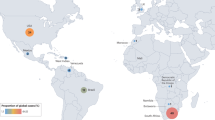Abstract
Huntington disease (HD), the most common inherited cause of chorea, is an autosomal dominant disorder, caused by an expanded trinucleotide CAG repeat (>39) in the HTT gene on chromosome 4p16.3. Among patients diagnosed as HD solely on clinical grounds, a certain number was negative on genetic testing for HD. Therefore, HD-like disorders comprised a number of genetic causes of chorea, that may be indistinguishable from HD (e.g. HD phenocopy syndrome). Recent data suggested that the C9orf72 expansion may be the most common genetic cause of HD phenocopy presentations. In continuation with this observation, we analyzed a small cohort of 39 patients with HD phenocopy syndrome and detected the C9orf72 expansion in one female patient (2.6 %) with two-year lasting mild generalized chorea and severe oro-bucco-lingual dyskinesia, who complained on forgetfullness (neuropsychological testing revealed dysexecutive syndrome with preserved episodic memory and recognition), unexplainable fears and increased appetite. Our results confirmed a possible role of the C9orf72 expansion in the genetic background of HD phenocopy syndrome.


Similar content being viewed by others
References
The Huntingtonʼs Disease Collaborative Research Group (1993) A novel gene containing a trinucleotide repeat that is expanded and unstable on Huntington’s disease chromosomes. Cell 72:971–983
Moore RC, Xiang F, Monaghan J et al (2001) Huntingtonʼs disease phenocopy is a familial prion disease. Am J Hum Genet 69:1385–1388
Wild EJ, Tabrizi SJ (2007) Huntingtonʼs disease phenocopy syndromes. Curr Opin Neurol 20:681–687
Moss DJH, Poulter M, Beck J et al (2014) C9orf72 expansions are the most common genetic cause of Huntington disease phenocopies. Neurology 82:292–299
DeJesus Hernandez M, Mackenzie IR, Boeve BF et al (2011) Expanded GGGGCC hexanucleotide repeat in noncoding region of C9orf72 causes chromosome 9p-linked FTD and ALS. Neuron 72:245–256
Renton AE, Majounie E, Waite A et al (2011) A hexanucleotide repeat expansion in C9orf72 is the cause of chromosome 9p21-linked ALS-FTD. Neuron 72:257–268
Wild EJ, Mudanohwo EE, Sweeney MG et al (2008) Huntingtonʼs disease phenocopies are clinically and genetically heterogenous. Mov Disord 23:716–720
Folstein MF, Folstein SE, McHugh PR (1975) “Mini-mental State”. A practical method for grading the cognitive state of patients for the clinician. J Psychiatr Res 12:189–198
Beck J, Poulter M, Hensman D et al (2013) Large C9orf72 hexanucleotide repeat expansions are seen in multiple neurodegenerative syndromes and are more frequent than expected in the UK population. Am J Hum Genetics 92:345–353
Feigin A, Talbot K (2014) Expanding the genetics of huntingtonism. Neurology 82:286–287
Akimoto C, Volk AE, van Blitterswijk M et al (2014) A blind international study on the reliability of genetic testing for GGGGCC-repeat expansions in C9orf72 reveals a marked differences in results among 14 laboratories. J Med Genet 51:419–424
Walker RH (2013) Chorea. Continuum 19:1242–1263
Aziz NA, Jurhens CK, Landwehrmeyer GB et al (2009) Normal and mutant HTT interact to affect clinical severity and progression in Huntington disease. Neurology 73:1280–1285
Acknowledgments
This work was funded by the Ministry of Education, Science, and Technological Development, Republic of Serbia (Project no. 175090).
Conflicts of interest
On behalf of all authors, the corresponding author states that there is no conflict of interest.
Ethical standard
This study has been approved by the Ethical Committee of the School of Medicine, University of Belgrade (Serbia) and have therefore been performed in accordance with the ethical standards laid down in the 1964 Declaration of Helsinki and its later amendments. All persons gave their informed consent prior to their inclusion in the study.
Author information
Authors and Affiliations
Corresponding author
Rights and permissions
About this article
Cite this article
Kostić, V.S., Dobričić, V., Stanković, I. et al. C9orf72 expansion as a possible genetic cause of Huntington disease phenocopy syndrome. J Neurol 261, 1917–1921 (2014). https://doi.org/10.1007/s00415-014-7430-8
Received:
Revised:
Accepted:
Published:
Issue Date:
DOI: https://doi.org/10.1007/s00415-014-7430-8




